Title search results
Showing 1 - 20 of 2298 items
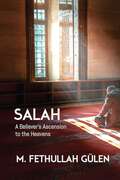
Salah: A Believer's Ascension to the Heavens
By Fethullah Gulen. 2025
Prayer is an essential part of a Muslim&’s life. While a believer can pray and offer their devotions any time…
and any where they like, Islamic tradition prescribes a specific form of prayers to be performed at five different times of the day. It is a celebratory act of submission in which believers align themselves with all other creation by offering their praise and gratitude to God, the Merciful, the Compassionate, as they stand, bow, and prostrate in propriety. These daily prayers are called salah, and this book is an all-comprehensive exploration of this spiritual act by one of the leading Muslim scholars of our time. The focus in this book is more on the spiritual aspect of salah, rather than its formulaic details which can be easily found in countless other manuals.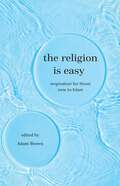
The Religion Is Easy: Inspiration for Those New to Islam
By Adam Brown. 2025
Islam continues to be a source of curiosity in a world where many other faith traditions are losing followers. Intended…
as inspiration for minds curious about Islam, The Religion Is Easy offers a rich content addressing many core issues, like the pillars of Islamic practice and scientific discoveries that relate to the Quran. Other intriguing concepts discussed in the book include &“authorship&” of the Scripture, why people convert, etc. Aiming to emphasize the fact that Islam is not a difficult, exotic, austere religion, but one that is easy to understand and easy to follow, The Religion Is Easy provides a modern angle that will appeal to non-Muslims with data on tangible features that argues that the world is created, not random. While combatting the misunderstanding and mistranslation of Islamic concepts such as jihad and fatwa often found in western media, the book also describes some heroes of Islam, from the Prophet&’s time (e.g. Bilal) to the present day (e.g. Sadio Mané).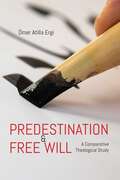
Predestination and Free Will: A Comparative Theological Study
By Omer Atilla Ergi. 2025
The concepts of predestination and free will have been and continue to be two of the most difficult problems of…
classical and contemporary theology and philosophy. The debate on the perplexing coexistence of predestination and free will has been the focal point of discourse among theologians and philosophers since antiquity. The deliberations on determinism also played an important role in the formation of Islamic theology, as the creedal statements of Islamic doctrines define belief in predestination as one of the essential articles of creed while asserting that human agents possess some form of will defined as irada al juz'iyya, &‘the minor will' in the Arabic lexicon. Evidently, the creed of mainstream Islam necessitates that the two concepts are reconciled or at least a conceivable argument is provided to support the notion that predestination could indeed coexist with free will. Arguments for coexistence constructed on scriptural revelation and Prophetic tradition were proposed by various Muslim theologians from the formative period to contemporary times, during which several theological schools emerged due to a number of significant differences in views. This book is primarily based on an examination and analysis of the theological arguments proposed by mainstream Islamic theologians and Fethullah Gülen, a contemporary Muslim scholar, and his theoretical framework on the reconciliation of predestination and free will. The methodology of this project includes comparative and detailed analysis of arguments put forward by formative, classical and contemporary Islamic scholars and examination of arguments proposed by Western theologians and philosophers with an objective to establish the similarities and differences in the theoretical frameworks of scholars from different schools, traditions, and faiths. The main argument of this book is based on the theological premises proposed by Fethullah Gülen and mainstream Sunni theologians that support the coexistence of predestination and free will.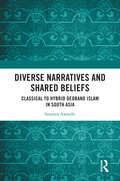
Diverse Narratives and Shared Beliefs: Classical to Hybrid Deoband Islam in South Asia
By Soumya Awasthi. 2026
This book delves into the intricate tapestry of Deoband Islam in India, Pakistan, and Afghanistan. Challenging simplistic narratives, it unveils…
the nuanced reality of Deoband Islam, revealing a diverse range of perspectives within the movement. It illuminates the movement's historical, social, and philosophical dimensions. It explores the movement's relationship with societal transformation and communal identity and its impact on the geopolitical dynamics of South Asia.The book offers a distinctive perspective on the Deoband school of thought in Islam by systematically categorising it into three distinct regional variants, each reflecting the unique socio-political context of its environment. The focus is on the Deoband school of thought, a strand within Sunni Islam that adheres to the philosophical framework of Ashari Maturidi. Critically examining its teachings uncovers the complexities and contradictions that shape Deobandi's thought, challenging popular assumptions and providing a fresh understanding. It also highlights the voices of Deobandi scholars and organisations who unequivocally denounce terrorism and actively work to counter radicalisation. Acknowledging their efforts, the book underscores the potential for dialogue and cooperation in promoting peace and understanding.With its comprehensive approach and thought-provoking analysis, this book is essential for scholars, policymakers, political science departments, theology, sociology, international relations, security studies, and South Asian studies.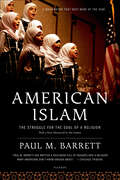
American Islam: The Struggle for the Soul of a Religion
By Paul M. Barrett. 2007
Vivid, dramatic portraits of Muslims in America in the years after 9/11, as they define themselves in a religious subculture…
torn between moderation and extremismThere are as many as six million Muslims in the United States today. Islam (together with Christianity and Judaism) is now an American faith, and the challenges Muslims face as they reconcile their intense and demanding faith with our chaotic and permissive society are recognizable to all of us.From West Virginia to northern Idaho, American Islam takes readers into Muslim homes, mosques, and private gatherings to introduce a population of striking variety. The central characters range from a charismatic black imam schooled in the militancy of the Nation of Islam to the daughter of an Indian immigrant family whose feminist views divided her father's mosque in West Virginia. Here are lives in conflict, reflecting in different ways the turmoil affecting the religion worldwide. An intricate mixture of ideologies and cultures, American Muslims include immigrants and native born, black and white converts, those who are well integrated into the larger society and those who are alienated and extreme in their political views. Even as many American Muslims succeed in material terms and enrich our society, Islam is enmeshed in controversy in the United States, as thousands of American Muslims have been investigated and interrogated in the wake of 9/11.American Islam is an intimate and vivid group portrait of American Muslims in a time of turmoil and promise.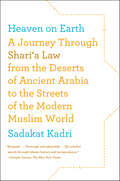
Heaven on Earth is a vivid, revealing, and essential narrative history of shari'a law--the widely contested and misunderstood code of…
Islamic justice--and how the application of its concepts has changed over time and, with it, the face of Islam.Some fourteen hundred years after the Prophet Muhammad first articulated God's law--the shari'a--its earthly interpreters are still arguing about what it means. Hard-liners reduce it to amputations, veiling, holy war, and stonings. Others say that it is humanity's only guarantee of a just society. And as colossal acts of terrorism made the word "shari'a" more controversial than ever in the early twentieth century, the legal historian and human rights lawyer Sadakat Kadri realized that many people in the West harbored ideas about Islamic law that were hazy or simply wrong. Heaven on Earth describes his journey, through ancient texts and across modern borders, in search of the facts behind the myths.Kadri brings lucid analysis and enlivening wit to the turbulent story of Islam's foundation and expansion, showing how the Prophet Muhammad's teachings evolved gradually into concepts of justice. Traveling the Muslim world to see the shari'a's principles in action, he encounters a cacophony of legal claims. At the ancient Indian grave of his Sufi ancestor, unruly jinns are exorcised in the name of the shari'a. In Pakistan's madrasas, stern scholars ridicule his talk of human rights and demand explanations for NATO drone attacks in Afghanistan. In Iran, he hears that God is forgiving enough to subsidize sex-change operations--but requires the execution of Muslims who change religion. Yet the stories of compulsion and violence are only part of a picture that also emphasizes compassion and equity. Many of Islam's first judges refused even to rule on cases for fear that a mistake would damn them, and scholars from Delhi to Cairo maintain that governments have no business enforcing faith.The shari'a continues to shape explosive political events and the daily lives of more than a billion Muslims. Heaven on Earth is a brilliantly iconoclastic tour through one of humanity's great collective intellectual achievements--and an essential guide to one of the most disputed but least understood controversies of modern times.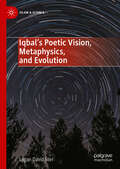
Iqbal’s Poetic Vision, Metaphysics, and Evolution (Islam & Science)
By Logan David Siler. 2025
This book explores Muhammad Iqbal&’s poetic vision of a universe in a state of becoming, and, by putting this vision…
in conversation with contemporary metaphysical models, articulates the contribution Iqbal&’s vision makes to discussions about Islamic theology, philosophy, and science. To do so, the book articulates Iqbal&’s critique of the Islamic tradition and distinguishes his system from classical Islamic thought while also highlighting his positive influences in this regard (Al-Biruni, Suhrawardi, etc). It explores features of Iqbal&’s vision in light of contemporary metaphysical models by emphasizing three key elements of his thought—metaphysics of becoming, panentheism and panpsychism. While locating Iqbal within the spectrum of these particular schools of thought, Logan David Siler discusses the strengths of his position, and reveals the relevance of his thought to the religion and science conversation—particularly in the realm of evolutionary biology. It is these realms of thought that articulate the most formidable challenges to the theistic view. Yet, Iqbal offers a vision which provides a means to challenge the more metaphysical claims of scientism. Additionally, Siler critiques the shortcomings of Iqbal's vision and offers suggestions for how to improve it.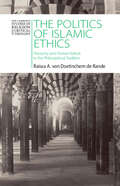
The Politics of Islamic Ethics: Hierarchy and Human Nature in the Philosophical Tradition (New Cambridge Studies in Religion and Critical Thought)
By Raissa A. von Doetinchem de Rande. 2025
Fundamental to Islamic thought is the idea that there is a way that human beings simply are, by nature or…
creation. This concept is called fiṭra. Rooting her investigation in the two central passages in the Qur'an and Hadith literature, where it is asserted that God created human beings in a certain way, the author moves beyond discussion of the usual figures who have commented on those texts to look instead at a group of classical Islamic philosophers rarely discussed in conjunction with ethical matters. Tracing the development of fiṭra through this overlooked strand of medieval thinking, von Doetinchem de Rande uses fiṭra as an entrée to wider topics in Islamic ethics. She shows that the notion of fiṭra articulated by al-Farabi, Ibn Bajja, Ibn Tufayl and Ibn Rushd highlights important issues about organizational hierachies of human nature. This, she argues, has major implications for contemporary political and legal debates.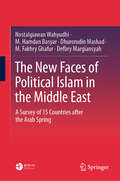
The New Faces of Political Islam in the Middle East: A Survey of 15 Countries after the Arab Spring
By Nostalgiawan Wahyudhi, M. Hamdan Basyar, Dhurorudin Mashad, M. Fakhry Ghafur, Defbry Margiansyah. 2025
This book provides a survey of the political situation in 15 Arab countries in the Middle East and North Africa…
and provides overviews of associated post-Arab Spring politics, with an emphasis of political Islamist movements. A translation from its original in Bahasa Indonesia, the book critically assesses the concept of post-Islamism from an Indonesian perspective. It argues that the wave of democratization in the Middle East following the Arab Spring failed to create an open democratic life in the region, except in the country where the Arab Spring began, Tunisia. Rather, it has left growing conflicts and destabilization in the region, with the rise of new authoritarianism. The authors simultaneously show that Islamic political movements in general are adaptive in the face of the changing political environment post-Arab Spring. They present the example of the Muslim Brotherhood as a movement with distinctive characteristics and high levels of adaptability in changing socio-political environments. It is relevant to advanced undergraduate and graduate students studying and researching contemporary Arab or Islamist movements and to scholars look for a neat comparative survey of countries after the Arab Spring.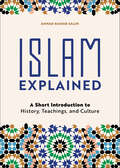
Islam Explained: A Short Introduction to History, Teachings, and Culture
By Ahmad Rashid Salim. 2020
A revealing guide to understanding the principles of IslamWith more than 1.8 billion followers worldwide, Islam is one of the…
world's largest religions, but it is also one that is poorly understood by many Americans. Islam Explained offers an informative overview of the faith, helping those who are new to Islam foster cultural awareness while also providing those already familiar with it the opportunity to deepen their understanding.Whether you are looking to expand your own knowledge of Islam or just better understand the practices of Muslim friends, coworkers, and neighbors, this concise and essential guide provides a solid foundation for future study and conversation.Islam Explained features:Easy-to-understand explanations—This book provides a complete overview ideal for those who are interested in Islam as a faith, a subject of study, and beyond.Historical contexts—Better understand the history of Islam, how the religion has evolved, and the ways that history has shaped the lives of Muslims.Beliefs and practices—Explore what it means to be a practicing Muslim, including the Five Pillars, laws, dress codes, and brief glimpses into how they vary between individual sects.Take yourself on a journey that will end in a better, more complete understanding of Islam.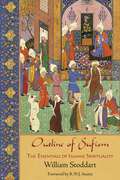
Outline of Sufism: the essentials of Islamic spirituality
By William Stoddart. 2012
"Followed by many millions of Muslims throughout the world, Sufism is the heart of Islamic spirituality. However, not only is…
there still in the West a widespread ignorance of Islam and Sufism, there is also, thanks to the "Islamic" terrorists, a widespread hostility. This book offers a succinct, yet comprehensive overview of Sufism's fundamental doctrines and spiritual practices. Stoddart highlights Sufism's intricate symbolism and explains the central role of the invocation of the Name of God in Sufi spiritual practice. An appendix includes central Koranic, Prophetic, and traditional Sufi sayings."-- Provided by publisher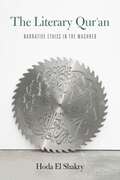
The Literary Qur'an: Narrative Ethics in the Maghreb
By Hoda El Shakry. 2020
Winner, 2020 Aldo and Jeanne Scaglione Prize for Comparative Literary Studies, Modern Language AssociationThe novel, the literary adage has it,…
reflects a world abandoned by God. Yet the possibilities of novelistic form and literary exegesis exceed the secularizing tendencies of contemporary literary criticism. Showing how the Qurʾan itself invites and enacts critical reading, Hoda El Shakry’s Qurʾanic model of narratology enriches our understanding of literary sensibilities and practices in the Maghreb across Arabophone and Francophone traditions. The Literary Qurʾan mobilizes the Qurʾan’s formal, narrative, and rhetorical qualities, alongside embodied and hermeneutical forms of Qurʾanic pedagogy, to theorize modern Maghrebi literature. Challenging the canonization of secular modes of reading that occlude religious epistemes, practices, and intertexts, it attends to literature as a site where the process of entextualization obscures ethical imperatives. Engaging with the Arab-Islamic tradition of adab—a concept demarcating the genre of belles lettres, as well as social and moral comportment—El Shakry demonstrates how the critical pursuit of knowledge is inseparable from the spiritual cultivation of the self.Foregrounding form and praxis alike, The Literary Qurʾan stages a series of pairings that invite paratactic readings across texts, languages, and literary canons. The book places twentieth-century novels by canonical Francophone writers (Abdelwahab Meddeb, Assia Djebar, Driss Chraïbi) into conversation with lesser-known Arabophone ones (Maḥmūd al-Masʿadī, al-Ṭāhir Waṭṭār, Muḥammad Barrāda). Theorizing the Qurʾan as a literary object, process, and model, this interdisciplinary study blends literary and theological methodologies, conceptual vocabularies, and reading practices.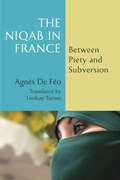
The Niqab in France: Between Piety and Subversion
By Agnès De Féo. 2024
This original new work is the fascinating result of sociologist and documentary filmmaker Agnès De Féo’s ten-year exploration of the…
phenomenon of niqab wearing. It is at once a groundbreaking study and a series of compelling first-person accounts from French and Francophone women who wear or have worn the niqab in France’s Salafi communities. With the backdrop of the French government’s 2010 ban on full facial veiling in public spaces, which itself has shaped the phenomenon, De Féo draws on her subjects’ own words to show their agency, working against the clichés that often underlie public views of the niqab—that it is purely the result of masculine pressure, for example, or extreme religiosity or nationalism, or the submissive desire to disappear. Instead, she shows, the niqab is multivalent: women wear it for reasons that range from religious piety to the desire to rebel against mainstream society, family, or the rule of law. The reasons are complex, overdetermined, contradictory, or even inconsistent, but they are the women’s own. Despite being worn only by a small minority of Muslim women, the Islamic garment has nonetheless been a major source of intense political, religious, and cultural debate in France. Searching to understand, rather than speculate, De Féo chose to approach the people who wear the niqab, and to make them, rather the veil itself, the subject of her research. Her unprecedented study, based on more than 200 interviews, reveals the many factors—social, political, geopolitical, and psychological—underpinning a personal choice that is not always as religious as it seems.The book ends with sixteen captivating interviews giving voice to stories rarely heard. With finesse and discernment, the author debunks the myths surrounding the wearing of the niqab, and sheds light on a practice subject to misunderstanding and prejudice, offering the reader unique insight. Challenging our preconceived notions and stereotypes about women who wear any form of Islamic apparel, but particularly the niqab, The Niqab in France introduces a group of women each with her own life story, her own share of personal struggles, aspirations, and desires, and her own claim to a certain place in society.This work received support for excellence in publication and translation from Albertine Translation, a program created by Villa Albertine.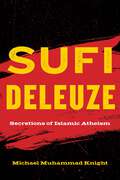
Sufi Deleuze: Secretions of Islamic Atheism
By Michael Muhammad Knight. 2023
“There is always an atheism to be extracted from a religion,” Deleuze and Guattari write in their final collaboration, What…
Is Philosophy? Their claim that Christianity “secretes” atheism “more than any other religion,” however, reflects the limits of their archive. Theological projects seeking to engage Deleuze remain embedded within Christian theologies and intellectual histories; whether they embrace, resist, or negotiate with Deleuze’s atheism, the atheism in question remains one extracted from Christian theology, a Christian atheism. In Sufi Deleuze, Michael Muhammad Knight offers an intervention, engaging Deleuzian questions and themes from within Islamic tradition. Even if Deleuze did not think of himself as a theologian, Knight argues, to place Deleuze in conversation with Islam is a project of comparative theology and faces the challenge of any comparative theology: It seemingly demands that complex, internally diverse traditions can speak as coherent, monolithic wholes. To start from such a place would not only defy Islam’s historical multiplicity but also betray Deleuze’s model of the assemblage, which requires attention to not only the organizing and stabilizing tendencies within a structure but also the points at which a structure resists organization, its internal heterogeneity, and unpredictable “lines of flight.”A Deleuzian approach to Islamic theology would first have to affirm that there is no such thing as a universal “Islamic theology” that can speak for all Muslims in all historical settings, but rather a multiplicity of power struggles between major and minor forces that contest each other over authenticity, authority, and the making of “orthodoxy.” The discussions in Sufi Deleuze thus highlight Islam’s extraordinary range of possibilities, not only making use of canonically privileged materials such as the Qur’an and major hadith collections, but also exploring a variety of marginalized resources found throughout Islam that challenge the notion of a singular “mainstream” interpretive tradition. To say it in Deleuze’s vocabulary, Islam is a rhizome.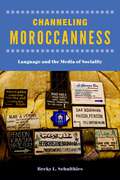
Channeling Moroccanness: Language and the Media of Sociality
By Becky L. Schulthies. 2021
Honorable Mention, 2022 L. Carl Brown AIMS Book Prize in North African StudiesWhat does it mean to connect as a…
people through mass media? This book approaches that question by exploring how Moroccans engage communicative failure as they seek to shape social and political relations in urban Fez. Over the last decade, laments of language and media failure in Fez have focused not just on social relations that used to be and have been lost but also on what ought to be and had yet to be realized. Such laments have transpired in a range of communication channels, from objects such as devotional prayer beads and remote controls; to interactional forms such as storytelling, dress styles, and orthography; to media platforms like television news, religious stations, or WhatsApp group chats. Channeling Moroccanness examines these laments as ways of speaking that created Moroccanness, the feeling of participating in the ongoing formations of Moroccan relationality. Rather than furthering the discourse about Morocco’s conflict between liberal secularists and religious conservatives, this ethnography shows the subtle range of ideologies and practices evoked in Fassi homes to calibrate Moroccan sociality and political consciousness.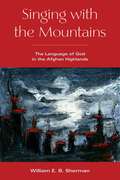
Singing with the Mountains: The Language of God in the Afghan Highlands
By William Sherman. 2024
Winner, Carolina's Outstanding Contribution to Middle East and Islamic Studies Book AwardAn illuminating story of a Sufi community that sought…
the revelation of GodIn the Afghan highlands of the sixteenth century, the messianic community known as the Roshaniyya not only desired to find God’s word and to abide by it but also attempted to practice God’s word and to develop techniques of language intended to render their own tongues as the organs of continuous revelation. As their critics would contend, however, the Roshaniyya attempted to make language do something that language should not do—infuse the semiotic with the divine. Their story thus ends in a tower of skulls, the proliferation of heresiographies that detailed the sins of the Roshaniyya, and new formations of “Afghan” identity.In Singing with the Mountains, William E. B. Sherman finds something extraordinary about the Roshaniyya, not least because the first known literary use of vernacular Pashto occurs in an eclectic, Roshani imitation of the Qur’an. The story of the Roshaniyya exemplifies a religious culture of linguistic experimentation. In the example of the Roshaniyya, we discover a set of questions and anxieties about the capacities of language that pervaded Sufi orders, imperial courts, groups of wandering ascetics, and scholastic networks throughout Central and South Asia.In telling this tale, Sherman asks the following questions: How can we make language shimmer with divine truth? How can letters grant sovereign power and form new “ethnic” identities and ways of belonging? How can rhyme bend our conceptions of time so that the prophetic past comes to inhabit the now of our collective moment? By analyzing the ways in which the Roshaniyya answered these types of questions—and the ways in which their answers were eventually rejected as heresies—this book offers new insight into the imaginations of religious actors in the late medieval and early modern Persianate worlds.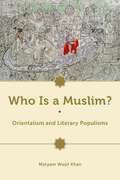
Who Is a Muslim?: Orientalism and Literary Populisms
By Maryam Wasif Khan. 2021
Who Is a Muslim? argues that modern Urdu literature, from its inception in colonial institutions such as Fort William College,…
Calcutta, to its dominant iterations in contemporary Pakistan—popular novels, short stories, television serials—is formed around a question that is and historically has been at the core of early modern and modern Western literatures. The question “Who is a Muslim?,” a constant concern within eighteenth-century literary and scholarly orientalist texts, the English oriental tale chief among them, takes on new and dangerous meanings once it travels to the North-Indian colony, and later to the newly formed Pakistan. A literary-historical study spanning some three centuries, this book argues that the idea of an Urdu canon, far from secular or progressive, has been shaped as the authority designate around the intertwined questions of piety, national identity, and citizenship.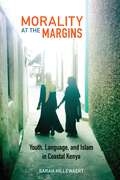
Morality at the Margins: Youth, Language, and Islam in Coastal Kenya
By Sarah Hillewaert. 2020
This book considers the day-to-day lives of young Muslims on Kenya’s island of Lamu, who live simultaneously on the edge…
and in the center. At the margins of the national and international economy and of Western notions of modernity, Lamu’s inhabitants nevertheless find themselves the focus of campaigns against Islamic radicalization and of Western touristic imaginations of the untouched and secluded. What does it mean to be young, modern, and Muslim here? How are these denominators imagined and enacted in daily encounters? Documenting the everyday lives of Lamu youth, this ethnography explores how young people negotiate cultural, religious, political, and economic expectations through nuanced deployments of language, dress, and bodily comportment. Hillewaert shows how seemingly mundane practices—how young people greet others, how they walk, dress, and talk—can become tactics in the negotiation of moral personhood.Morality at the Margins traces the shifting meanings and potential ambiguities of such everyday signs—and the dangers of their misconstrual. By examining the uncertainties that underwrite projects of self-fashioning, the book highlights how shifting and scalable discourses of tradition, modernity, secularization, nationalism, and religious piety inform changing notions of moral subjectivity. In elaborating everyday practices of Islamic pluralism, the book shows the ways in which Muslim societies critically engage with change while sustaining a sense of integrity and morality.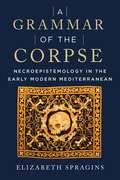
A Grammar of the Corpse: Necroepistemology in the Early Modern Mediterranean
By Elizabeth Spragins. 2023
No matter when or where one starts telling the story of the battle of al-Qasr al-Kabir (August 4, 1578), the…
precipitating event for the formation of the Iberian Union, one always stumbles across dead bodies—rotting in the sun on abandoned battlefields, publicly displayed in marketplaces, exhumed and transported for political uses. A Grammar of the Corpse: Necroepistemology in the Early Modern Mediterranean proposes an approach to understanding how dead bodies anchored the construction of knowledge within early modern Mediterranean historiography.A Grammar of the Corpse argues that the presence of the corpse in historical narrative is not incidental. It fills a central gap in testimonial narrative: providing tangible evidence of the narrator’s reliability while provoking an affective response in the audience. The use of corpses as a source of narrative authority mobilizes what cultural historians, philosophers, and social anthropologists have pointed to as the latent power of the dead for generating social and political meaning and knowledge. A Grammar of the Corpse analyzes the literary, semiotic, and epistemological function these bodies serve within text and through language. It finds that corpses are indexically present and yet disturbingly absent, a tension that informs their fraught relationship to their narrators’ own bodies and makes them useful but subversive tools of communication and knowledge.A Grammar of the Corpse complements recent work in medieval and early modern Iberian and Mediterranean studies to account for the confessional, ethnic, linguistic, and political diversity of the region. By reading Arabic texts alongside Portuguese and Spanish accounts of this key event, the book responds to the fundamental provocation of Mediterranean studies to work beyond the linguistic limitations of modern national boundaries.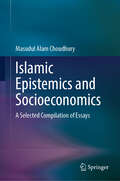
Islamic Epistemics and Socioeconomics: A Selected Compilation of Essays
By Masudul Alam Choudhury. 2025
This book presents selected essays on the epistemological foundation of the Islamic world-system, in the light of the exegesis of the…
Qur’an, to develop existing understandings of Islamic economics. A selection of key contributions by one of the world's leading figures working at the nexus of Islamic social sciences, Islamic philosophy, and Islamic economics, the book integrates applied foundations of Islamic economics and Islamic philosophy, presenting a critical outlook on the existing state of Islamic economics and Islamic finance, within a broader framework of socio-scientific enquiry, philosophical perspectives on Islam, and philosophy of science. The author confronts the absence of epistemic groundwork upon which any fresh social and scientific enquiry is developing in Islamic economics, casting the discussion within an explanatory framework of ‘the unity of knowledge’ as bestowed by Islamic monotheistic law, which substantively characterizes the generalization and details of ‘everything’. The present work unravels this objective methodology and its application with reference to a limited number of issues and problems in global economics. Complex and multidisciplinary in its treatment, this book presents the key arguments on mathematical, philosophical, and socio-scientific modes of inquiry in deriving, developing, and empirically applying the Qur’anic methodology of the “unity of knowledge” to economic problems. It is relevant to scholars and advanced students in social scientific studies of Islam, Islamic theology and philosophy, and Islamic economics and finance.